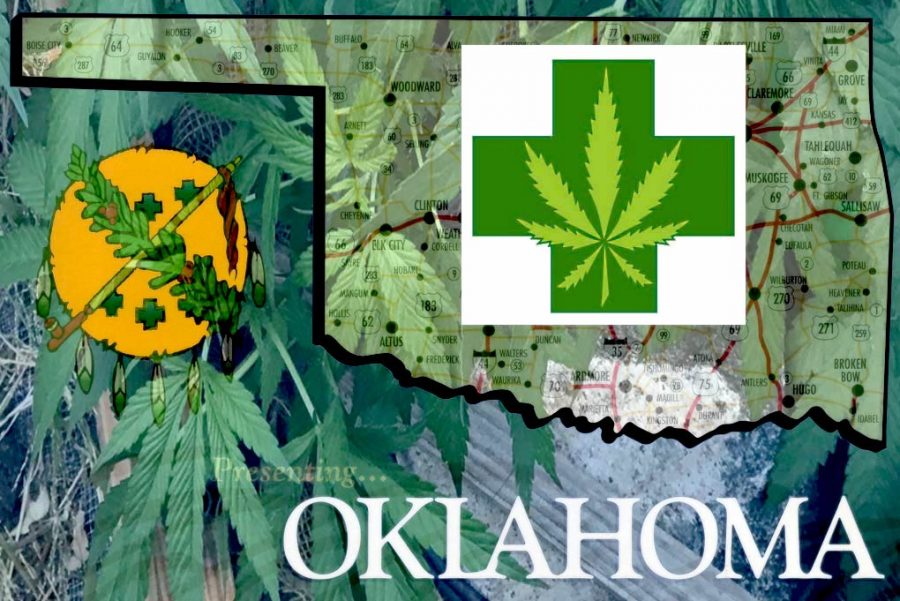Oklahoma sees record medical cannabis state taxes as Arkansas consumers stock up
The low cost of cannabis in Oklahoma has prompted hordes of Arkansans to make the five-hour drive for a stash top-up. As a direct effect of this, Oklahoma’s medical cannabis market has boomed in value, whereas the medical cannabis market in Arkansas has struggled to retain customers.
A report released by the Southwest Times Record in Fort Smith revealed that the cost of cannabis in Oklahoma is about half the amount of that in Arkansas. It’s not just the contrasting price tags that are pushing people to cross the border for their weed but also, the fact that the list of qualifying conditions for medical cannabis in Arkansas is limited in comparison with its western neighbor.
For patients who wish to purchase medical cannabis in Oklahoma, a doctor’s recommendation is all that is required. Conversely, the process is much simpler in the “Sooner State,” where patients simply arrange a doctor consultation; physicians are not obligated to register with the Oklahoma Medical Marijuana Authority. Although a simple process, a fee of $100 applies for out-of-staters who wish to purchase a temporary patient card with 30-day validity.
Arkansas‘ dispensary closures pushing consumers to Oklahoma’s medical cannabis market
While it’s clear that residents from Arkansas are shopping at cannabis dispensaries in Oklahoma, the true severity of COVID-19’s impact on Arkansas’ medical cannabis market remains uncertain. The state may not have been issued a stay-at-home order – unlike most U.S. states – but store closures mean that Oklahoma gains a competitive edge.
Lawmakers in Oklahoma categorized medical cannabis dispensaries as “essential businesses”, with retail stores currently offering customers two options for obtaining their medicine: curbside pickup and online cannabis sales.
“According to the information we have received, Oklahoma Medical Marijuana businesses are considered essential services and will not be required to close at this time,” reads a tweet published by the Oklahoma Medical Marijuana Authority on March 24. Just two days later, the Authority wrote another tweet stating that curbside pick-up is not forbidden by Oklahoma’s cannabis laws.
“Oklahoma law does not prohibit curbside pick-up; dispensaries must ensure all applicable rules are followed, including proper license verification, monthly reporting of the sale & packaging requirements. The law does not allow for delivery to patients or caregivers. #COVID-19,” wrote officials.
A week earlier, on March 17, the Arkansas Department of Health told reporters that patient applications are still being processed; in spite of the COVID-19 “lockdown”. The Department confirmed that “there are currently no delays to processing times.”.
Oklahomans purchased more medical cannabis in April than ever before
Last month was a successful one for Oklahoma’s medical cannabis industry, with figures published by the Oklahoma Tax Commission revealing that April saw more dispensary transactions than ever before. In fact, tax collections climbed by more than 25 percent last month. The Commission pinned April’s cannabis sales taxes somewhere in the range of $9.8 million; inclusive of the typical sales taxes and a seven percent tax that is imposed on all cannabis products in Oklahoma.
Based on careful analysis of tax collections, approximately $61.4 million – or 217 per enrolled patient – was spent on medical cannabis in Oklahoma throughout the month of April. March was also a successful time for medical cannabis sales in Oklahoma, with data showing that $7.8 million was pulled in for the entire month. At this point, the tax figures marked the most lucrative month-to-month increase since sales were recorded last summer.
The rise in cannabis sales taxes in Oklahoma could be attributed to the COVID-19 pandemic. Why? Because the surge in tax revenue emerged after Gov. Kevin Stitt imposed his “Safer at Home” order that forced “nonessential” businesses to close temporarily. Fortunately for cannabis dispensary owners in the state, the industry is being deemed “essential” and therefore businesses are allowed to continue operating during the Coronavirus crisis.
“With the stay-home order in place, and medical marijuana dispensaries being categorized as essential health services, Oklahoma patients were afforded the ability to take their medicine on a more regular basis and sample a broader range of available medicines,” said the executive director of the Oklahoma Cannabis Industry Association, Bud Scott.
It should be noted that the data released by the Tax Commission is non-inclusive of sales volume and therefore the increase in tax collections may be a repercussion of inflated retail prices. Nonetheless, numerous dispensaries are believed to have slashed their prices during April in an effort to increase sales










